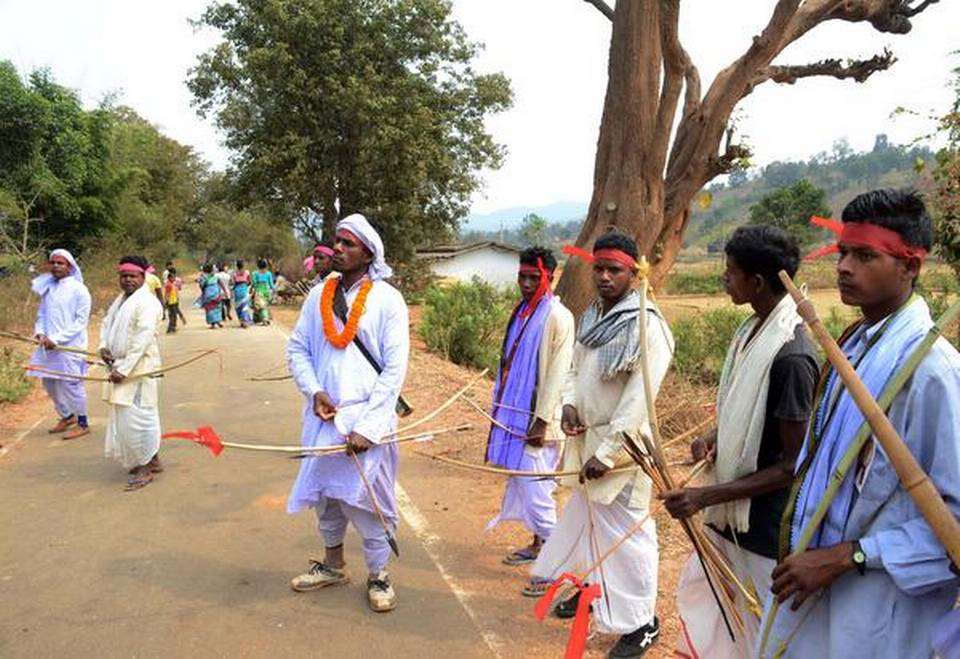As many as 30 villages in Jharkhand’s Khunti district have declared that they will not vote in the upcoming Lok Sabha elections scheduled in the area in the fifth phase on May 6, 2019.
Reason? A hostile state machinery!

Represenatation Image Photo Credit: Manob Chowdhary / The Hindu
The Pathalgadi movement in Jharkhand
Pathalgadi is an ancient tradition of Adivasis and forest dwelling communities. More recently, residents of many villages in Jharkhand erected traditional stone plaques with inscriptions of articles from Constitution, provisions of Panchayats (Extension to Scheduled Areas) Act, 1996 (PESA) and fifth schedule inscribed on them. This came to be known as Pathalgadi movement deriving from the words Pathal meaning rock and Gadhi meaning to dig or to erect or to build.
The Khunti district in Jharkhand has been the epicentre of the Pathalgadi struggle. Khunti is also the home to biggest Adivasi icon, Birsa Munda. As per Adivasi rights activist, Dayamani Barla, “permanent camps of CRPF” came up in at least five villages of the Adivasis dominated district Khunti, in January 2019. Reportedly, the land was first obtained in the name of public services like community houses and when the villagers refused to give their land, it was acquired forcefully by picking up innocent villagers and Gram Sabha leaders and threatening them with false cases.
Mounting repression
The Pathalgadi movement that resulted from the two-year long Adivasi agitations against the government’s proposal to introduce land acquisitions laws and state domicile eligibility, saw a wave of support from the villagers mainly Adivasis who declared the Gram Sabha as the sovereign authority.
However, owing to the popularity of the movement among people, it faced severe repression from the Jharkhand state and police machinery, with as many as 150 named FIRs and thousands of unnamed FIRs.
Many of them are still facing sedition charges. In July, 2018, the Jharkhand police slapped 26 sedition cases against as many as 20 senior activists allegedly for publishing social media posts critical of the Raghubar Das-led BJP government and apparently for “playing a prominent role in Pathalgadi movement.” These included activists Father Stan Swamy, former Congress MLA Theodore Kiro, and Aloka Kujur. They were also charged with allegations of creating communal tension, violating IT Act, and cause law and order problems. The activists, at that time had rejected these as the scare tactic of the government. One of them, Kiro had said, “Jharkhand is facing an undeclared emergency. Here, the state government is targeting all those who do support its policies…At the centre of our struggle is the conflict over land.”
Afraid to go out of homes
Out of fear of further repression, local people were already alarmed and fearful of the police. As a result, people were avoiding local police. Now, security forces have organised camps in local schools, says Sunil Minz, a local activist based in Ranchi. He added that Adivasis are scared that the government may cause harm to them if they go out. So, 30 villagers have announced that they will not participate in voting. Villagers say that they are scared to walk out of their houses. Local activists add that people are scared that the government may cause more harm if they go outside.
Reaching out to local authorities, especially L Khiangte, the chief electoral officer of Jharkhand, has been of no avail, as per the report in DownToEarth.
No recourse to justice
Civil society members wrote a letter to Khiangte saying, “We would like to bring to your notice the attempts by local administration and police across the state to dissuade people to discuss their issues under the pretext of Model Code of Conduct, which applies only to political parties and not citizens). Recently, members of JJM were detained by Bishunpura police and a non-political meeting on issues of Right to Food they were addressing was stopped. The district administration claimed later that section 144 was in place in the district. But it is yet to share the copy of the notification. It seems it has become a practice to routinely apply section 144 as soon as model code of conduct comes into force.”
They even expressed worry that “section 144 is being used to stop people from discussing their issues in non-political gatherings during elections.”
Khiantge claimed that he is unaware of the letter by civil society members, but he is aware of the issues and reportedly said that he will run awareness programmes to convince locals.
Though the Governor is supposed to be the custodian of tribal rights and is supposed to make decisions in consultation with the Tribes Advisory Council, however, Jharkhand having one of the largest tribal populations, does not so far have Tribal Affairs Ministry.
In these situations, how can the rights of Adivasis be ensured and where is the security for their life if they do indeed decide to vote? An entire movement has been blemished because of the nexus of the police, corporates and the state government.